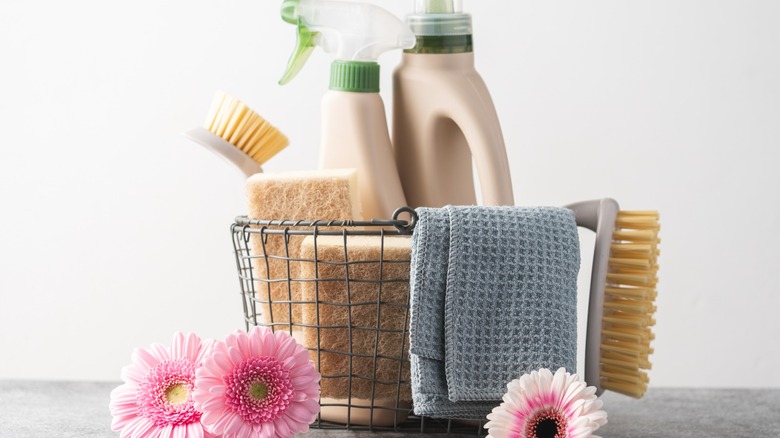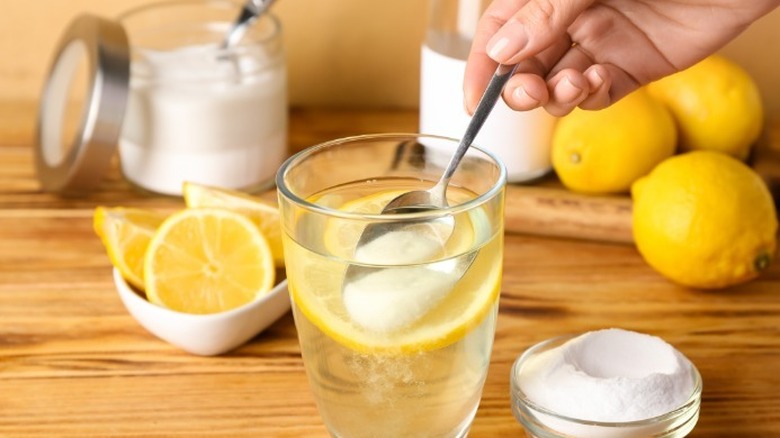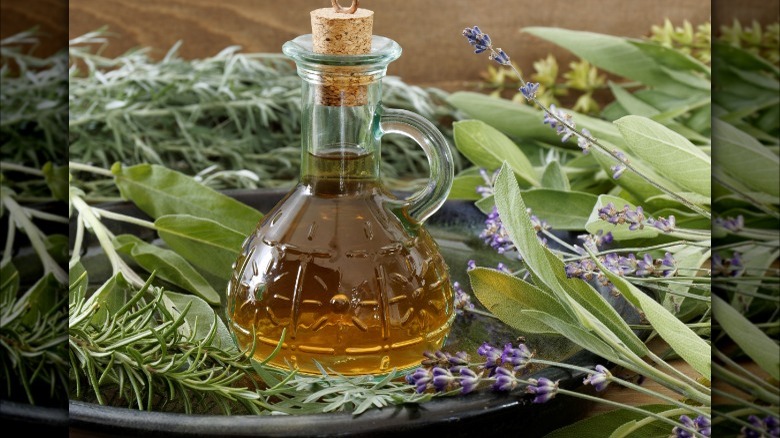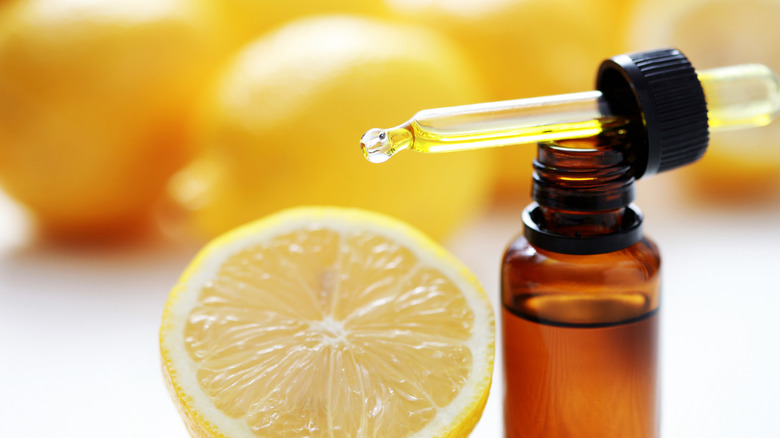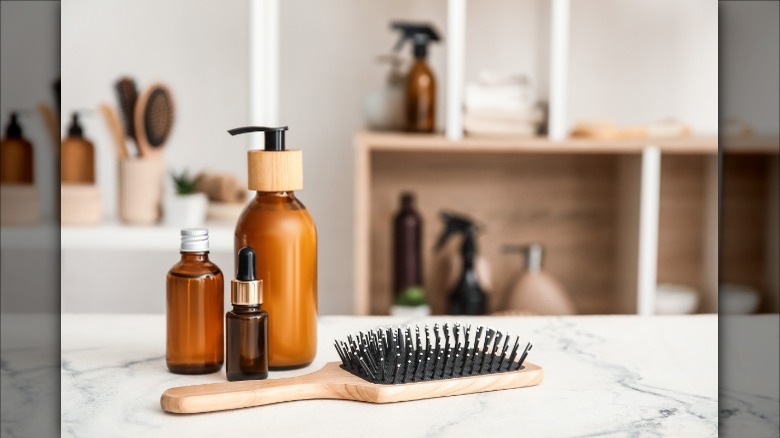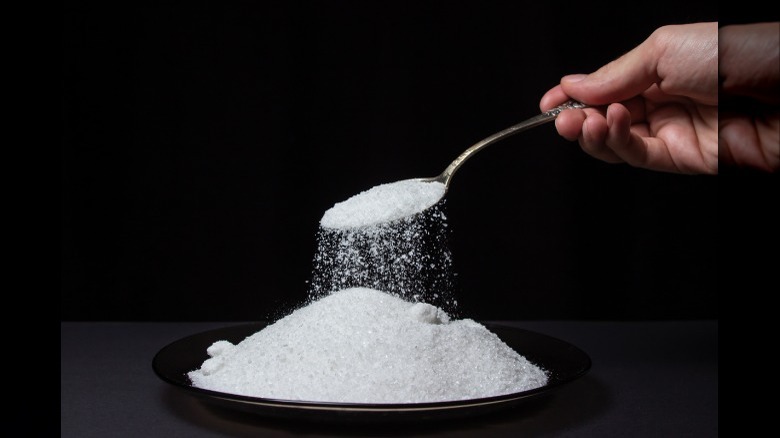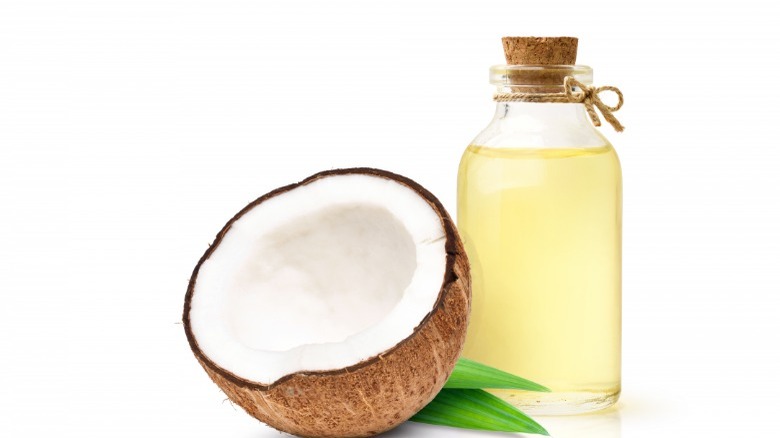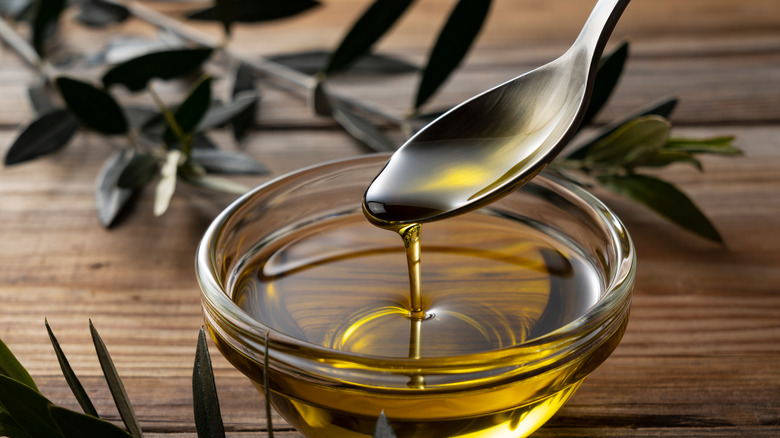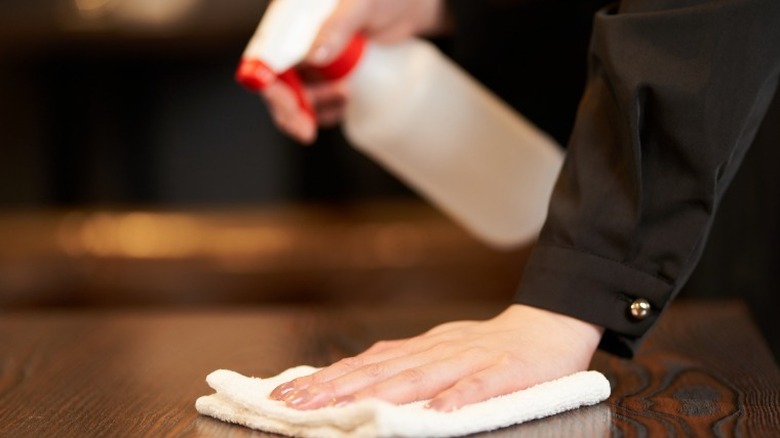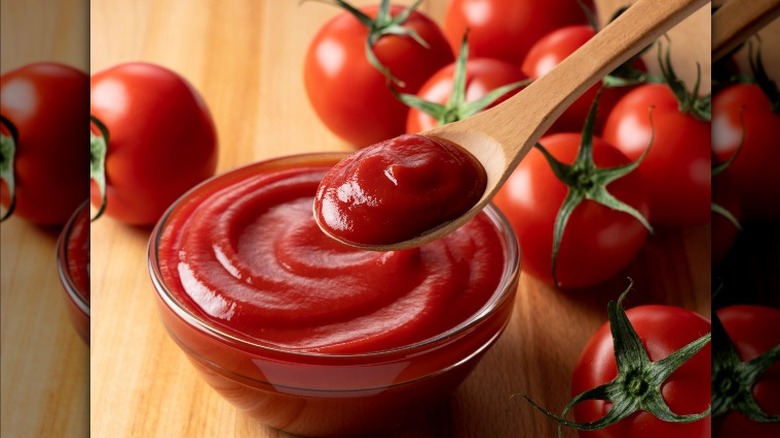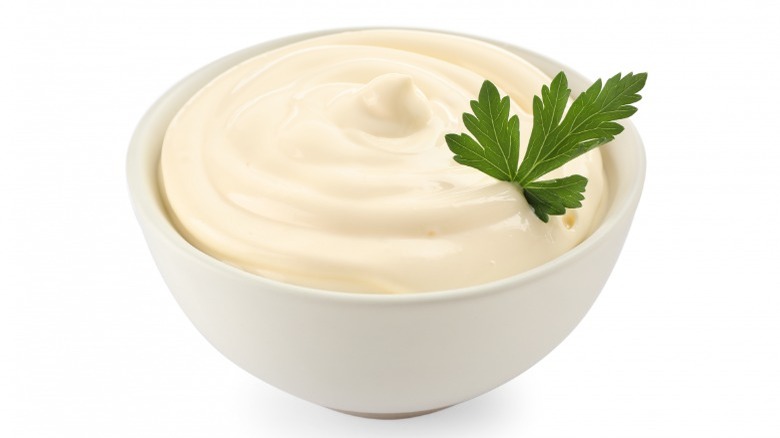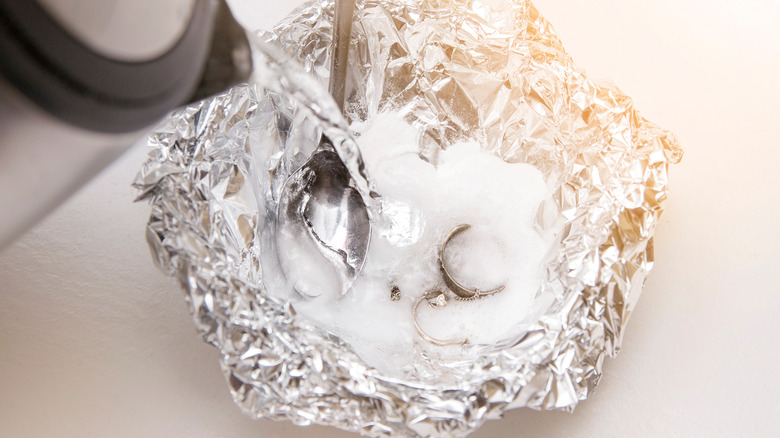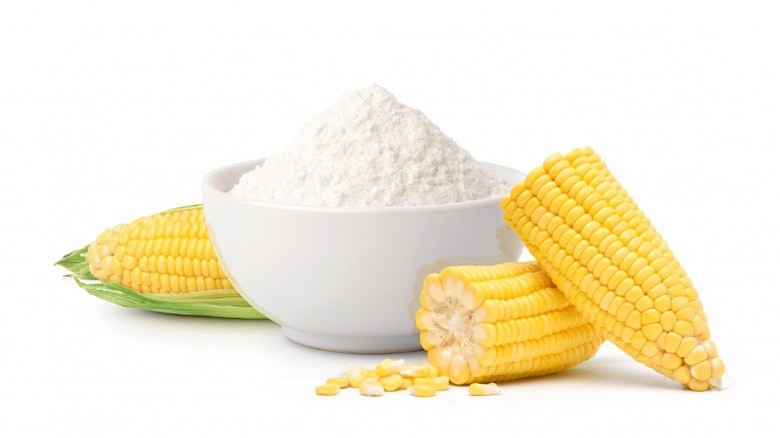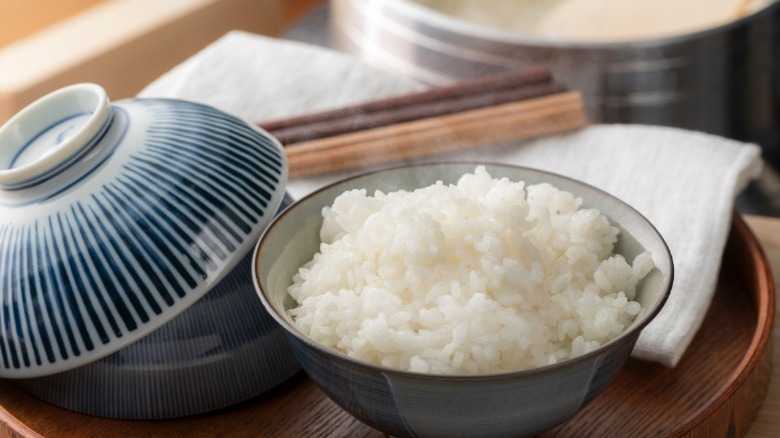Essential Cleaning Products Everyone Should Always Have On Hand
We may receive a commission on purchases made from links.
Nowadays, when it comes to cleaning, a variety of healthier, natural, and more affordable options are available. This is important when you consider the abundant dangers of common household cleaning products, as noted by the American Lung Association. These include aerosol spray products, air fresheners, detergent, dishwashing liquid, rug and upholstery cleaning products, furniture and floor polish, and oven cleaners. Many of these, even some that claim to be "all-natural," contain toxic chemicals that can pose serious health risks.
Some of these chemicals include volatile organic compounds (VOCs), chemicals that vaporize at room temperature and can irritate your eyes and throat and cause headaches among other health risks. Such toxins have even been linked to respiratory disorders and cancer. This knowledge makes it necessary to pursue other cleaning alternatives. "Many years ago I decided to start making my own cleaning products," as Erin, founder of Lemons, Lavender & Laundry, shared with Better Homes & Gardens. "At first, it was simply a way to save money. Then, it became a way to reduce toxic chemicals in our home."
When you find out how many everyday items can be used to clean your place, you won't ever miss your old cleaners. In fact, some of these products you likely already have on hand are probably just collecting dust in the pantry. This newfound knowledge will make cleaning a less taxing experience on your wallet and your health.
Baking soda
In addition to its uses in cooking, baking soda is a powerful household cleaner. As popular lifestyle magazine Better Homes & Gardens noted, baking soda can be used to clean everything from the bathroom to the kitchen to flooring and upholstery. "I love baking soda for so many things," cleaning expert Mary Findley told the magazine. Findley uses baking soda, along with vinegar, in boiling water to create a potent mixture for cleaning dirty stove drip pans.
A second article from Better Homes & Gardens named 15 things to clean using baking soda. These include windows, carpets, curtains, mugs and dinnerware, sinks and drains, Tupperware, and tile grout. It can also be used to clean kitchen appliances, including the refrigerator, microwave, and oven. In addition to cleaning, baking soda can neutralize odors, such as inside the refrigerator and the garbage can as well as inside stinky sneakers. "I never knew baking soda was such a powerful, effective cleaning agent until I started to explore all the ways it can be used," Erin of Lemons, Lavender & Laundry explained to the magazine. "The list goes on."
Vinegar
Most cleaning experts agree: Vinegar is a must for cleaning household items and spaces. "Vinegar is made from acetic acid so this makes it a natural disinfectant," Homes & Gardens Global Editor in Chief Lucy Searle said in a 2022 article for Better Homes & Gardens. "It's a brilliant product to have in the ... cupboard and avoids using store-bought abrasive cleaners," she added. This all-natural cleaner is also affordable, as a gallon of organic white vinegar lasts for months. Added Kadi Dulude of Wizard of Homes: "I love using vinegar for house cleaning" (per Apartment Therapy). "It's really affordable, healthy, and effective."
Another helpful tip: Add a bit of vinegar to your dishwasher if your regular dishwashing cleaner isn't cutting it. "To get sparkling dishes, use dish soap as normal and add about two cups of vinegar to the bottom of your dishwasher," Dulude said. Per Apartment Therapy, vinegar is effective at cleaning a variety of surfaces except for natural wood and stone, such as granite, as the acid can wear away its protective sealant. Consumer Reports warned about using vinegar to clean floors, ranges, and washing machines and adding it to a clothing iron. According to Real Simple, vinegar should also be avoided on stainless steel knives and appliances, cast iron surfaces, waxed and unfinished wood surfaces, hoses and rubber gaskets, and the screens of your favorite electronics.
Lemons and lemon essential oil
If you've ever been told that lemon is great for detoxing, it's true. Just as it can be used to detoxify the body, lemon can also be used for cleaning. Lemon juice is effective at removing stains and grease from stove tops and microwaves, as well as cleaning glass, as Apartment Therapy noted.
If squeezing real lemons isn't your thing, lemon essential oil is a convenient alternative that provides the same benefits. Just make sure to use lemon oil from a high-quality brand that does not use additives. doTERRA is one such brand. The global supplier of essential oils and other essential oil-infused natural products conducts extensive testing, including from third parties, to ensure that consumers are provided with pure oils. According to doTERRA's blog, lemon essential oil can be used to clean windows, furniture, countertops, stainless steel surfaces, and the toilet bowl. Additionally, lemon oil is effective at removing stains and sanitizing and freshening the air.
Essential oils
Intrigued by lemon oil? That's only the tip of the iceberg. Tea tree, lavender, eucalyptus, and orange oil are all effective natural cleaners. HGTV suggests using essential oils to make dryer sheets, hand sanitizer, and carpet cleaner. Essential oils can also be mixed for powerful cleaning combinations. Popular essential oils brands doTERRA and Young Living even offer their own proprietary oil cleaning blends.
Per Apartment Therapy, tea tree oil helps clean shower soap scum and mildew. Use it on its own, or, as the outlet advises, combine 20 drops of tea tree oil with two cups of distilled white vinegar and two teaspoons of non-castille-based liquid dish soap. Add the mixture to a spray bottle and spritz daily after showering.
In addition, use eucalyptus oil to clean your hair brushes. Add one-and-a-half cups of water, a half cup of distilled white vinegar, and 20 drops of eucalyptus oil to a bowl. Add your brushes, letting them soak for 20 minutes before rinsing and air drying. With its antibacterial properties, lavender is effective for cleaning and disinfecting surfaces — leaving them smelling great, too. Add 10 drops to a spray bottle filled with water. Then shake and spritz. If you've ever gotten gum stuck to your shoe, it's super annoying, but orange oil can help. Apply a drop or two with a cotton ball, and the gum will start loosening up. If removing gum from clothing, follow the same instructions and throw in the wash.
Salt
If you've got plenty of salt at home that's not being put to use, we have one for you: cleaning. The Salt Institute even named over 14,000 uses for salt (via Express). Salt is also inexpensive to purchase, and a little goes a long way. An added convenience, according to Homes, is that any table salt will work; you don't need to use iodized or sea salt. Additionally, keep in mind that if cleaning with salt and water, you'll want to wear gloves to avoid irritating any open cuts or sores.
Reader's Digest names a ton of cleaning uses for salt for every room in the house (and some other locations, such as the car windshield). In the kitchen and bathroom, salt can remove stains from coffee mugs and tea cups, remove grease stains, lift food from pots and pans, clear oven spills, remove lipstick marks from glasses, unclog drains, clean cloudy vases, and sanitize cutting boards and the refrigerator.
Elsewhere at home, you can use salt to remove red wine from carpet, restore faded linens, remove rust and grass stains, clear out chimney soot, clean an iron, brighten sweaty clothing, freshen dirty brooms, polish brass and copper, clean fish tanks, restore wicker items, and remove watermarks from wood.
Coconut oil
Coconut oil is a healthier alternative to other cooking oils (via Today), but did you know it's also great for cleaning? "While coconut oil is most widely used in cooking and beauty routines, it can also be used in a variety of ways around the home for cleaning and quick fixes," as Heather Smith, a healthy living trends expert, shared with Realtor. "Coconut oil is great to use around the home because it's natural, unprocessed, nontoxic, and antibacterial."
Some ways coconut oil can be used for cleaning include restoring wood, preventing water stains, removing rust from squeaky hinges, removing crayons from the wall, and cleaning leather. You can even use coconut oil to remove stickers and as an all-natural way to clean the shower. "Coconut oil contains lauric acid, which has natural antimicrobial properties," Traci Kantowski, certified health coach and communications director for the Coconut Coalition of the Americas, said in an article for Realtor. "Mix coconut oil with baking soda to form a paste that can be used on bathroom and kitchen grime. Spread it, wait around 10 minutes, and then scrub."
Bob Vila added a few more cleaning uses for coconut oil: polishing appliances, maintaining blades, protecting cast-iron skillets from rust, cleaning your car dashboard, and removing and preventing dust buildup from ceiling fans.
Olive oil
We love olive oil for cooking, yet it turns out that this yummy-tasting oil is also an effective cleaning agent. To start, it can be used in the kitchen to create a scrubbing paste for cleaning cast-iron pans by adding it to a teaspoon of salt. Or simply pour some olive oil onto a cloth and get excited as your stainless steel appliances get shiny in no time at all (via Apartment Therapy). You can also use it to protect wicker and rattan furniture, polish wooden surfaces, and remove scratches from leather furniture. According to Real Simple, other cleaning uses for olive oil are as a lubricant for squeaky doors and as a way to remove paint or gum and get pesky stickers unstuck.
Olive oil also comes in handy in the bedroom and bathroom. Per The Spruce, use a drop to shine up pearl jewelry using a soft cloth. Have a ring on your finger you can't seem to remove? Just coat your finger in olive oil and carefully loosen the ring until it's off your finger. Olive oil will also unstick zippers and shine up shoes and boots. It's also great for removing heavy makeup, especially mascara since it moisturizes your lashes at the same time.
Rubbing alcohol
Rubbing alcohol is a staple in bathrooms across America for its ability to disinfect. According to Health Essentials, a publication of the Cleveland Clinic, what's sold at stores is made up of isopropyl alcohol and water. Rubbing alcohol also ranges in strength — anywhere from 50% to 90% isopropyl alcohol. "Lower concentrations aren't as good at killing germs," said family physician Sarah Pickering Beers, MD. "But very high concentrations can be harsher when used on the skin. The 70% variety tends to be a good choice for most household uses."
Many people use rubbing alcohol to clear up pimples since it's an astringent. While it can be effective, Beers warned, "alcohol can be drying, so it isn't the best choice for sensitive or acne-prone skin. If you do try it, make sure to use a moisturizer afterward." Per Apartment Therapy, alcohol should never be applied to your skin in large amounts.
As Health Essentials noted, rubbing alcohol is effective for cleaning jewelry and makeup brushes, clearing dry-erase boards, defrosting your windshield, cleaning chrome and stainless steel (porous kitchen surfaces), and wiping down electronics. "In this case," advised Beers, "90% isopropyl alcohol is a good choice since it evaporates faster than lower concentrations." The doctor, however, warned never to use rubbing alcohol near fire, as it's flammable, and never to mix it with bleach, since this can create toxic fumes. Of course, never swallow it, and, via Apartment Therapy, never use it in unventilated rooms.
Ketchup
If you never thought that common condiments serve cleaning purposes, think again. Ketchup is one such condiment. Interestingly, it's found in 97% of homes in America, according to The Spruce, and each person in the U.S. consumes approximately three bottles of ketchup every year.
For cleaning, ketchup can be used to polish brass, as cleaning coach Leslie Reichert told Realtor. "Just let it sit for five to 10 minutes, then wipe," she said. "Because ketchup is highly acidic, it works to eat through the oxidation on brass." Mary Findley, author of "The Complete Idiot's Guide to Green Cleaning," recommends using ketchup only to clean some, but not all, surfaces. "Ketchup would be fine to use on stainless steel and nonporous surfaces that are not worn down," she said. "Porcelain could be iffy, and plastic and fabrics of any kind are a no-no."
Ketchup is also helpful in shining silver, polishing copper, loosening up food burned onto pots, removing rust from metal, and polishing stainless steel.
Mayonnaise
Mayonnaise, a whipped concoction of lemon juice, eggs, vinegar, and spices (per Insider), is another common condiment with surprising cleaning benefits. One is removing watermarks from wood, according to Bruce Lubin, author of "Who Knew? Household Shortcuts," who shared this trick with Today.
According to Bob Vila, mayonnaise can also be used to remove crayons from the wall, quiet squeaky doors, get stickers unstuck, remove watermarks from wood, and clean off yucky gum from the bottom of your shoe. And, if you didn't know that your plant leaves need cleaning, they do. This is because dust, while, of course, looking dirty, prevents plants from getting all the nutrients they need from sunlight. Just use some mayonnaise to shine up those plant leaves and help your plants be more likely to undergo photosynthesis.
As Insider adds, mayonnaise is also helpful for polishing silver, removing bumper stickers, cleaning piano keys, removing tree sap, and removing gum when accidentally caught in hair.
Aluminum foil
Aluminum foil is not only useful for storing leftovers; it's also a great tool for cleaning. The pantry staple can be used to remove rust, shine up tarnished silverware, and clean the grill, according to the popular cleaning service Merry Maids. As Arie Hazan of Arie's Catering in Columbus, Ohio, shared with All Recipes, "Aluminum foil is great at scrubbing food build-up off of your grill grates safely." This is because grill brushes typically shed bristles, which you don't want winding up in your food the next time you barbecue. He suggests "wad[ding] up a ball of aluminum foil, lightly dous[ing] your grill grates with water and start scrubbing ... this cleaning hack helps cut our post-grilling clean-up time down drastically."
In addition, All Recipes recommends using aluminum foil to scrub pots and pans, remove stains and rust from chrome faucets and appliances, clean the bottom of the oven, and to make stovetop cleaning easier. Just line the burners with aluminum foil, making sure to replace the foil liners often, and keep a watchful eye on them while cooking to prevent any possible fires from starting.
Cornstarch
Cornstarch is another common cooking ingredient that has uses beyond the kitchen. According to The Spruce, it can be used "to clean almost anything," including kitchen cooktops, pots, and pans.
Margaret Boyles shared some of the many uses for cornstarch in an article for Almanac. Cleaning uses for cornstarch include polishing silver, removing stains, cleaning glass, and scrubbing the bathtub. In addition, The Spruce suggests using it to remove grease stains from clothing and to erase annoying oil stains from the driveway. Or, use cornstarch to remove carpet stains, clean stuffed animals, and refresh mattresses around the house.
Cornstarch is also just as popular for neutralizing odors as it is for cleaning and removing stains. According to The Spruce, cornstarch can be commonly used to freshen up rubber gloves and to make stinky sneakers smell good — just sprinkle some into the shoes, and let it sit until morning. Then, shake out the shoes to remove the excess cornstarch.
Rice
While this one might sound a little odd, trust us. The next time you make rice with dinner, hold onto your rice water (what's left over after rinsing rice prior to cooking) for cleaning up.
Blogger and health advocate Sabrina Wang shared a longtime cleaning tip with Apartment Therapy, one she learned from her grandmother: how to use rice water to clean the dishes, the countertop, and even kitchen appliances. "This is something that many people in China still do to this day," she said. "Rice is so common there, so instead of wasting the water we use to wash rice, we collect it." FYI: If you're not already washing rice prior to cooking, you should be because it removes the starch and minerals found in rice and prevents the rice from sticking together.
Rice water, however, can't do it all. This includes removing grease since rice water is slightly acidic with an approximate pH of 6. Additionally, if using rice water for cleaning, use short-grain or long-grain white rice — less healthy but better for cleaning. "Avoid basmati rice or brown rice since these types of rice don't have that much starch, which is what makes rice water such a good cleaning agent," she advised.
